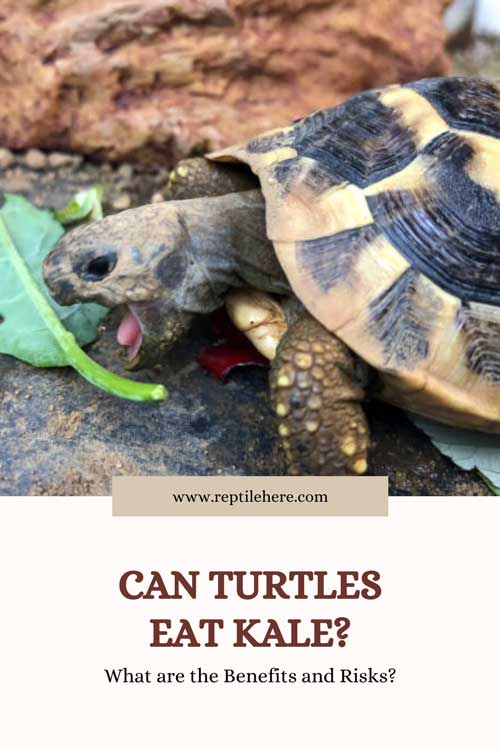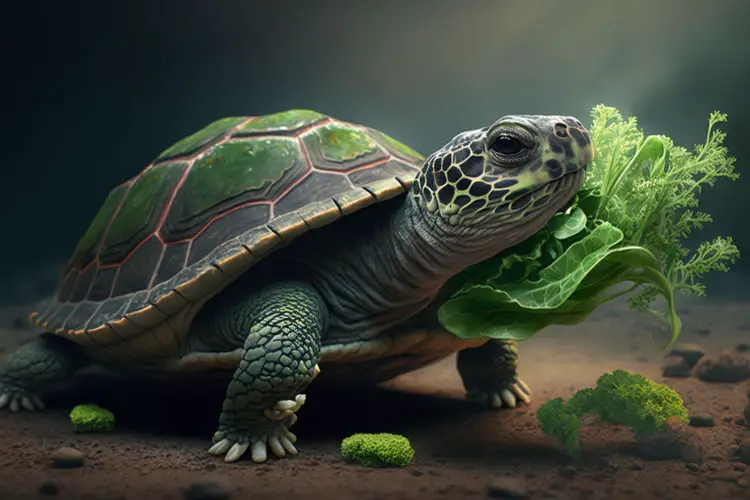Can Turtles Eat Kale? What are the Benefits and Risks?
Wild turtles eat a lot of vegetables. Pet turtles, on the other hand, are mainly fed with pelleted foods. They don’t eat vegetables like kale often though they carry many useful nutrients. So, you might wonder, is kale good for turtles?
Can turtles eat kale? Yes, turtles can consume kale. It contains vitamins and minerals such as calcium and vitamin K, and antioxidants that are good for turtles. Kale also contains high amounts of fiber. Although it has some oxalic acid, the amount is low and poses no risk to turtles.
Kale is an excellent food for turtles. So, before you feed your turtle some kale, here’s how to prepare kale, the amount you should feed your turtle, and some of the benefits of the vegetable to turtles.
Can You Feed Kale To Your Turtles?
Contents
Turtles can eat kale. The green, leafy vegetable contains several minerals and vitamins, making it an ideal addition to a turtles diet.
In addition to supplying about 42 calories of energy, this vegetable has a high fiber content. This is great for your reptile friend since fiber helps food move more easily along the digestive tract.
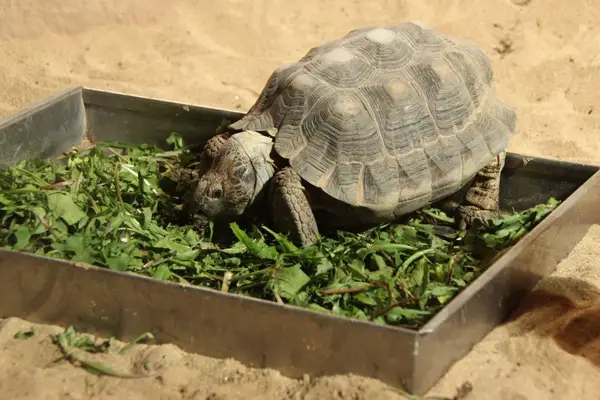
According to Medical News Today, a 118 grams serving of kale contains;
- Energy – 42.5 calories
- Fiber – 4.7 g
- Calcium – 177 mg
- Manganese – 0.6 mg
- Magnesium – 29.5 mg
- Phosphorous – 49.6 mg
- Potassium – 170 mg
- Vitamin C – 21 mg
- Vitamin K – 494 mcg
- Vitamin A – 172 mcg
| Nutrient | Benefits |
| Vitamin K | Vitamin K helps in bone formation and shell calcification. Vitamin K works together with prothrombin to clot blood and prevents excessive bleeding. |
| Calcium | Turtles need calcium to grow strong bones and harden their shells. Calcium also helps maintain proper muscle function. |
| Vitamin C | Vitamin C supports the immune system and the turtle’s response to stress. |
| Vitamin A | Vitamin A supports the healthy growth of a baby turtle by promoting the formation of mucus membranes and healthy skin. |
| Manganese | The manganese found in kale helps blood clotting, facilitates metabolism and growth, and is involved in reproduction. |
| Potassium | Potassium is vital for the normal functioning of muscles, nerves, and the heart. |
| Magnesium | Magnesium helps regulate blood pressure and increases metabolism. |
| Phosphorous | Phosphorous aids in the formation of strong bones and also the storage of energy in the body. |
Turtles are omnivorous; hence they need to eat vegetables and fruits as part of a balanced and varied diet. Kale is a leafy vegetable that is an excellent source of calcium and vitamin K, making it one of the best vegetables for your turtle.
The calcium to phosphorus ratio of kale promotes the growth of strong and healthy bones. Also, the oxalate content in kale is very low, so there won’t be any adverse effects when the turtle eats the vegetable.
Do Turtles Like Kale?
Turtles love eating kale. In the wild, turtles are omnivores that eat whatever they can get. Mostly, they eat grasses, fruits, and vegetables since those are easier to get than hunting animals. Hence, turtles enjoy eating kale and most other vegetables.
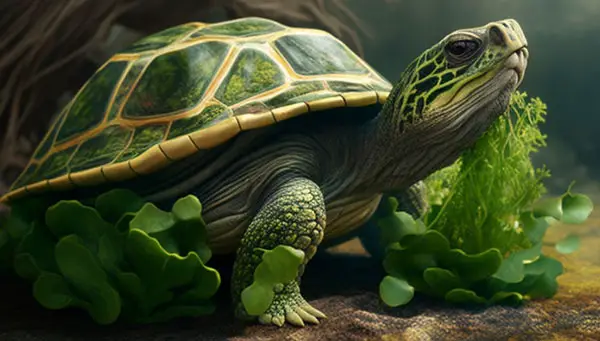
Health Benefits Of Feeding Turtles Kale
Kale contains several important nutrients and minerals. Some health benefits of turtle eating kale are:
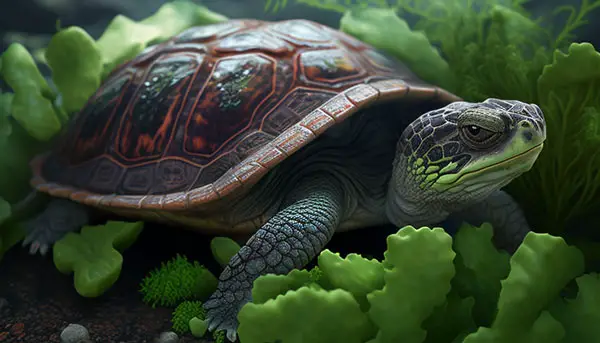
High calcium content
Kale has a calcium to phosphorous ratio of about 3:1, which is close to the ideal 2:1 balance for turtles. Since the phosphorous isn’t more than calcium, there is no danger of a calcium deficiency caused by inhibiting calcium absorption.
Calcium helps grow a hard shell and strong, healthy bones. Because of the high calcium content, kale is a great addition to the diet of a baby turtle.
Low-calorie content
Vegetables are generally low in sugar, and kale is no exception. For certain sugar-rich foods, you must watch how much your turtle eats. However, you can let a turtle eat as much kale as possible without risking obesity and other health issues.
How Much Kale Should Turtles Eat?
You can feed as much kale to your pet turtle as it can eat since turtles love eating kale, and it poses no risk to their health. However, remember that turtles need to eat a balanced diet to remain healthy, so don’t feed them exclusively on kale.
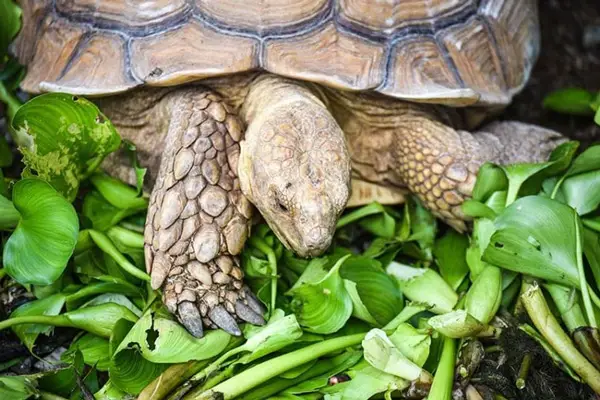
How Do You Prepare Kale For Turtles?
Turtles can eat both raw and cooked kale. However, cooking the vegetable eliminates most nutrients, so serving it raw is the better option.
Before feeding the turtle, wash the kale to remove any pesticides. Organic kale is a good alternative since it’s grown using no pesticides. Since turtles don’t like eating stems, remove them and cut the kale into small pieces.
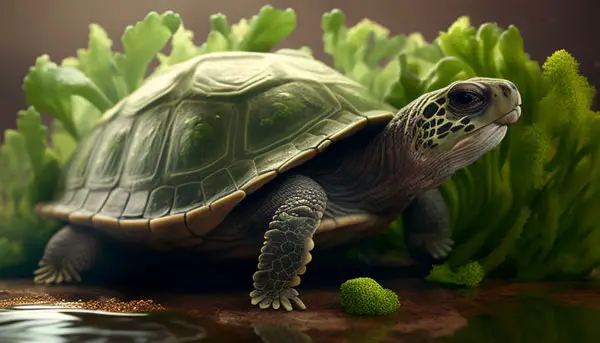
Can You Feed Kale To Baby Turtles? How?
Yes, baby turtles can be fed with kale. Kale is an excellent source of calcium and other minerals that promote healthy growth, making it great for baby turtles. To feed kale to baby turtles, wash it, remove the stems and chop it into small pieces.
An aquatic turtle eats a bite of kale.
Frequently Asked Questions (FAQs)
Box turtles, just like other turtles, can eat kale. The vegetable contains high amounts of calcium which is good for strong bones. Kale’s fiber content helps with digestion and increases satiety while reducing the likelihood of obesity. Besides, box turtles love kale, so it’s a great treat.
Red-eared slider turtles love kale. Since kale is rich in minerals and nutrients, you can add it to the turtles’ daily diet. The red-eared turtles will enjoy eating the vegetable while gaining crucial minerals such as calcium. However, the kale consumed should not consist of more than a quarter of the diet.
Painted turtles enjoy a meal of kale. They can eat all kinds of kale, including red and curly kale. All you have to do is wash the kale thoroughly, cut out the stems since they don’t like it, and then chop the leaves into tiny pieces before serving it to the painted turtles.
Conclusion
Kale is an excellent food for turtles because of its rich nutrient and mineral content. Its calcium to phosphorus ratio is ideal for baby and adult turtles. Besides being a nutritious food, its low oxalate content means that turtles can enjoy eating as much kale as possible without adverse health effects.
Do you want to know if turtles eat goldfish or pineapples? Read our articles about it to learn more.
